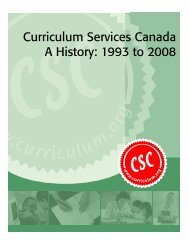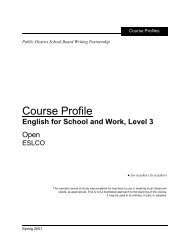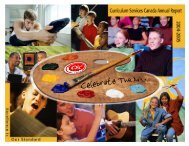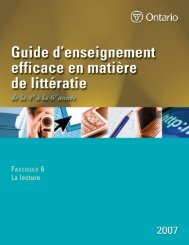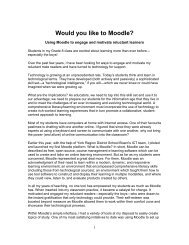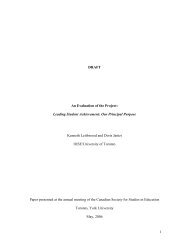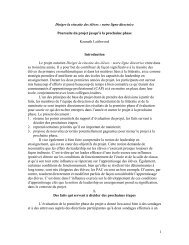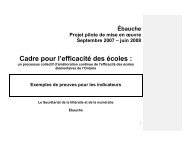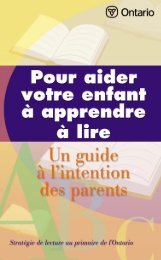Course Profile - Curriculum Services Canada
Course Profile - Curriculum Services Canada
Course Profile - Curriculum Services Canada
Create successful ePaper yourself
Turn your PDF publications into a flip-book with our unique Google optimized e-Paper software.
• The Expectations are central to all aspects of this profile. The context in which each unit is delivered,<br />
the skills and concepts developed, and the assessment tasks used must be interconnected, and linked<br />
to the Expectations. The assessment data accumulated throughout the course must be sufficient (in<br />
kind and number) to permit teachers to evaluate the consistent level of performance for each student<br />
in each of the four categories in the Achievement Chart for Science (The Ontario <strong>Curriculum</strong>,<br />
Grades 11 and 12, Science, 2000 pp. 174–175).<br />
• Some of the expectations are given special emphasis in learning activities and are often revisited.<br />
These are expectations that are taught, assessed, evaluated, and where necessary, revisited using<br />
alternate instructional strategies.<br />
• Students interpret new information in terms of what they already know. They try to make sense of<br />
what is taught by trying to fit it into their experiences. A key concept is understood when students<br />
examine significant examples that represent the concept, then create a generalization from those<br />
personal experiences. The teachers must be aware of the experiences that students have had prior to<br />
Grade 12 and use them as the basis for new and more complex concepts. Students may also arrive<br />
with misconceptions from prior experience that will interfere with their ability to understand new<br />
concepts. Identifying misconceptions and revising them using concrete examples may be required at<br />
times. A number of diagnostic tools and activities are suggested throughout the profile.<br />
• Terminology, formulae, and algorithms should be viewed by students as tools for describing<br />
observations, solving problems, and communicating ideas, not isolated pieces of information. It is<br />
important to emphasize key skills and concepts without obscuring them by expecting students to<br />
memorize a multitude of facts, equations, and formulae. (For example, the nomenclature of inorganic<br />
and organic chemicals should be limited to what is helpful to understand key concepts.) Students<br />
could be encouraged to develop reference sheets of significant formulae, algorithms and concepts for<br />
use in class and on tests or examinations. When the size of the sheet is limited, e.g., to a single-sided<br />
sheet of paper, handwritten, preparation requires that students review their work, then identify and<br />
summarize critical information. Such reference sheets may be submitted for assessment and<br />
evaluation of Learning Skills. Teachers may also choose to supply a reference sheet for student use.<br />
Use of reference sheets allows teachers to move the focus of evaluation away from factual recall and<br />
toward higher-level thinking skills.<br />
• Assessment should focus on the application of terminology to explain concepts and phenomena, not<br />
on terms and definitions in isolation. It is essential that students understand the concept before<br />
acquiring the vocabulary.<br />
• This profile describes a chemistry course in which students are encouraged to ask their own<br />
questions and, in many cases, find their own answers by inquiry (experiment or research).<br />
Fundamental to the skill set of a scientifically literate person/citizen is the ability to ask incisive<br />
questions, to interpret the answers critically, and to identify un-stated assumptions.<br />
• In this profile, there is a reduced emphasis on traditional laboratory activities in which students are<br />
provided step-by-step instructions. Teacher demonstrations can be used in place of these activities<br />
and the time saved used for developing students’ ability to devise and carry out true experimental<br />
inquiry. The teacher’s role is to decide what knowledge and skills students must have to proceed<br />
safely and successfully in a laboratory setting. Many traditional laboratory exercises can be opened<br />
up by rewording statements into questions, and replacing detailed procedures with a teacher-led class<br />
discussion. This could be followed by a challenge, which requires students to devise a procedure and<br />
confirm with the teacher that safety factors have been adequately addressed before carrying it out. By<br />
making decisions regarding what data to collect and which format to use for reporting both data and<br />
results, students develop skills of inquiry and communication essential in science.<br />
Page 3<br />
• Chemistry – University Preparation



